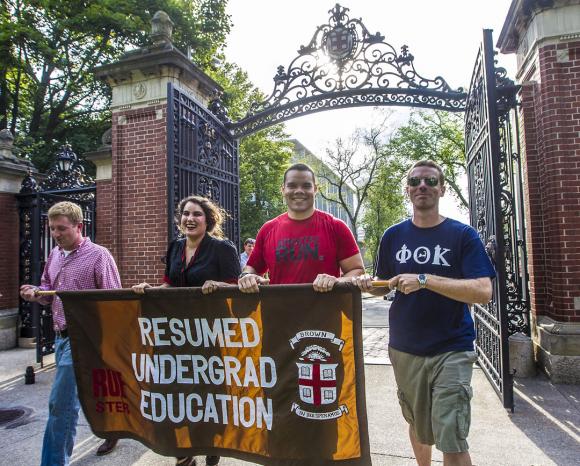PROVIDENCE, R.I. [Brown University] — At its winter business meeting Saturday, Feb. 7, 2015, the Corporation of Brown University formally accepted gifts and approved a fiscal 2016 budget that will significantly enhance undergraduate financial aid at the University:
- Undergraduate Resumed Education (RUE) will receive $1 million a year for the next 15 years from an anonymous donor in support of financial aid. The gift will allow an increase in the number of RUE students on campus.
- The Sidney Frank Scholars program, which provides scholarships to students with the greatest financial need, will receive $10 million in additional support from the Sidney E. Frank Foundation, allowing Frank Scholars to participate more fully in internships and other summer learning experiences.
- Financial aid packages for new students from middle-income families will have a modest increase in awards and a reduction in expected parental contribution as part of a 8-percent increase in the financial aid budget.
$15-million gift will fund RUE financial aid
Brown University’s Resumed Undergraduate Education (RUE) program has received a gift that will provide $1 million annually in financial aid funding for the next 15 years. The gift, from an anonymous donor, will provide incremental scholarships, loan relief, and, beginning in the summer of 2016, waivers from required summer earnings for students who are completing undergraduate studies that had been delayed or interrupted.
The RUE program serves students who have been out of high school for six years or more. RUE students are drawn from a wide range of backgrounds. Among the group are parents, military veterans, and community college students.
“Each year, the RUE program admits a small number of talented non-traditional students to Brown. This gift places RUE scholarships on a firm and dependable footing and will allow the University to increase the number and diversity of resumed undergraduate students in the campus community,” said Brown University President Christina Paxson. “This generous gift represents a significant step toward the day when Brown can extend its need-blind admission policy to all RUE applicants.”
Strengthening financial aid is an important element in Building on Distinction, the University’s strategic plan. Brown maintains a commitment to provide 100 percent of the demonstrated financial need of all undergraduates. Although its admission procedures for entering first-year domestic students are fully need-blind, admission into the RUE program is need-aware.
Brown normally includes about 17 RUE students in the undergraduate student body and provides a financial aid budget of approximately $725,000. The Resumed Undergraduate Education Financial Aid Fund, established by this gift, will allow that number to increase slowly to 30 or more RUE students. The donor is encouraging the University to raise an endowment that would fund the RUE financial aid budget in perpetuity.
Sidney Frank Scholars program adds internship support
The Sidney E. Frank Foundation has awarded Brown a 10-year, $10-million grant that will create the Sidney E. Frank Scholars Endowed BrownConnect Fund and increase the existing Sidney E. Frank Endowed Scholarship Fund.
The Frank Scholars BrownConnect Fund will allow each Frank Scholar to participate in a summer internship or a summer UTRA (Undergraduate Teaching and Research Award) experience during their time at Brown. A well-chosen internship or UTRA is an increasingly important part of the undergraduate experience, but is often out of reach for students who cannot afford to accept an unpaid or low-paying summer internship. Frank Scholars who want to participate in an UTRA or internship will receive one Brown LINK Award (Linking Students to Internships and Knowledge) or one summer UTRA award and a waiver of that summer’s earning requirement.
In November, Brown launched BrownConnect an initiative designed to engage Brown alumni and others who can provide internships, research opportunities, and other resources and to connect current Brown students with these opportunities.
Half of the new gift will be used to establish the Sidney E. Frank Scholars Endowed BrownConnect Fund. The summer awards will be underwritten by a combination of current-use and endowed funds so that the Sidney E. Frank Scholars Endowed BrownConnect Fund will be fully endowed by the end of the 10-year grant period.
The second half of the grant and any surplus current-use funds from the summer awards will enhance the Sidney E. Frank Endowed Scholarship Fund, allowing the University to increase the number of Frank Scholars. That fund, established in 2004 with a $100-million gift from 1942 alumnus Sidney E. Frank, provides four years of loan-free scholarship support to Sidney Frank Scholars — students in each class who have the greatest financial need. There are approximately 130 Sidney Frank Scholars in the undergraduate student body.
Undergraduate financial aid budget reaches $112.5 million
As part of the University’s consolidated budget for fiscal year 2016, the Corporation approved a substantial increase in the undergraduate financial aid budget. The financial aid budget will grow 8 percent from the amount budgeted in the current year — 7.1 percent more than the University will have actually spent this year — to a total of $112.5 million.
Financial aid has been among the fastest growing items in the budget for many years, significantly outpacing the rate of increase in tuition and fees.
Increased support for middle-income families
As they prepared budget recommendations for the Corporation, administrators looked closely at how financial aid policies affect students from families with incomes between $100,000 and $200,000, the middle-income range for applicants to Brown and peer institutions. In many cases, those families have few assets beyond home equity and retirement accounts and may have more than one child in college. Administrators determined that while other parts of the financial aid program are competitive with peers, financial aid packages for these families lag behind.
In the 2015-16 academic year, newly enrolled students from middle-income families will receive a modest increase in awards, which will decrease the expected parental contribution. The University will review the effect of this change when the admission cycle for the Class of 2019 is complete.

